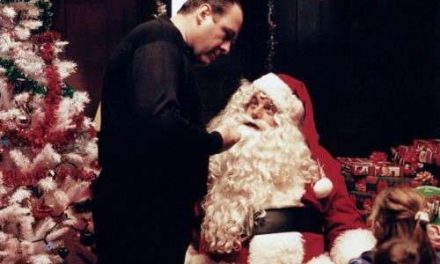You have to feel sorry for Broadchurch creator, Chris Chibnall. His ability to hold and manipulate the audience, demonstrated so brilliantly in series 1 of Broadchurch, seems to have deserted him and newspaper and television websites are full of angry viewers berating series 2 for not living up to expectations – the expectations which had of course been hyped by stories of the absolute secrecy which surrounded Chibnall as he worked on the script. Interestingly this seems to be have been led by audiences angrily responding to more sympathetic initial critical responses from, for instance, Mark Lawson in The Guardian and Jim Shelley in the Daily Mail. Things have reached such a pitch that after episode 4 viewers were even complaining about the misrepresentation of service in a restaurant chain or as the Mail Online put it
The pressure to make a second series when a television drama proves a hit has always been there but is increased now with the emphasis on the success of US and Nordic long serial drama. Recently British commissioners have followed suit with a tranche of speedy recommissioned second series including Peaky Blinders (BBC2), The Fall (BBC2), Happy Valley (BBC1) and The Missing (BBC1).
I am sure that there are lots of problems with second series which need to be analysed through a knowledge of the production process but I am very interested in the audience response particularly as, in the case of Broadchurch 2, I share it. I too have been shouting at the television, told myself that I could turn it off and not continue the torment, continued to watch just because I couldn’t believe how bad it could be (and because Olivia Coleman is still so watchable).
Series 2 cannot simply repeat what worked so well in series 1, particularly in a drama which depends much less on repetition than, say, a conventional sit com. So the complaints are not that Broadchurch2 is different but that it doesn’t seem to understand what we liked about the first series. We feel let down not because series 2 is different but because it is different in the wrong way. And the audience response seems to boil down to three factors:
1. Implausibility. This is the rallying cry of the Broadchurch 2 refuseniks – it’s ‘unrealistic’, it ‘wouldn’t have happened like that’. But it’s important to note that the reference point for much of this is not from real life but other crime series. According to The Daily Mail, Broadchurch 2 has been absolutely skewered over what appeared to be legal mistakes. Most of the law-abiding citizens who’ve argued about these and many other ‘mistakes’ aren’t drawing on their own experiences of appearing in court. And at some point the explanation that this is drama, not documentary loses its force. If the programme is incredible because it veers so frequently away from the procedures of policing and law which we think we know then it runs the risk of being incredible on all fronts from Nando’s waiting service to how a pregnant woman’s waters break. We don’t trust it any more.

2. A change of pace. Broadchurch 1 was characterised by a slow buildup with particular problems or characters being explored in each episode. Broadchurch 2 is running two plots side by side – one the trial of the character deemed to be guilty in the first series and the return of the case of two murdered girls which haunted Alec Hardy in series 1. Both are packed with incident and running the two together doesn’t give us time to be interested or intrigued by any of the new characters, particularly the barristers played by Charlotte Rampling and Marianne Jean-Baptiste who are woefully served by the script and stereotyped respectively as a batty old lady with failing eyesight and a loud black woman with a son in prison.


In the meantime, the second story has charged along trying to establish exactly what happened before Broadchurch 1 and to find who did it (whatever it is). Series 1’s tactic of dangling possible suspects before us was sustained by the episode structure; now that’s lost and the chief suspect hangs around in the fields observing Hardy running round in circles. The matter of pace seems particularly difficult for returning drama series which deal with one puzzle, one crime, across a number of episodes. It seems to be more easily handled in the ‘old-fashioned’ series format which allows stalwarts like Silent Witness and New Tricks to return again and again to BBC and the new Suspects to get a quick second series on Channel 5. Not that Broadchurch 2 shouldn’t have tried something different but it could have had some respect for the pitfalls.
3. Characterization. The old characters too pose problems. One is repetition. Both Beth and Ellie, for instance, have got rather stuck in series 2. Beth continues to grieve for her dead son and to harshly refuse to have anything to do with Ellie who was once her best friend. This may actually be realistic but it doesn’t get her anywhere as a character. Similarly Miller continues to rush around at Hardy’s behest, protesting but giving in to his increasingly bizarre orders. I long for her to say ‘No’ to something but last week she even agreed to share a hotel bed with him. And this problem of repetition applies also to the increasingly bizarre characterisation of Alec Hardy as played by David Tennant. His actions get wilder and wilder but we seem no closer to understanding exactly why his personality leads him to be so rash and solipsistic.

One feature of the complaints about Broadchurch 2 is that it is becoming more like a soap opera. This apparently offers an explanation for its implausibilities, its plot swerves and its repetition. But because they have a much more longterm and secure relationship with their audience, soaps are actually in a better position to carry viewers over things that would otherwise cause problems. It’s interesting I think that Sally Wainwright has been more successful with continuing with Last Tango in Halifax and Scott & Bailey both of which draw on some soap opera modes of writing. Perhaps Happy Valley 2 will be okay though it will be interesting to see how re-balances the crime/detective elements against those dealing with family life.
And perhaps after all Broadchurch 2 can climb out of the pit it has catastrophically fallen into with the remaining episodes. I guess I’ll still be watching.
Christine Geraghty is an Honorary Professorial Fellow at the University of Glasgow. Her publications on television include a contribution to the 1981 BFI monograph on Coronation Street; Women and Soap Opera (Polity, 1991); and My Beautiful Laundrette (I B Taurus, 2004). Her BFR TV Classic on Bleak House was published in 2012 and her reflections on the beginning of her work on soap opera appears in ‘The BFI women and film study group 1976 – ?’, Renewing Feminisms, Radical Narratives, Fantasies and Futures in Media Studies H. Thornham and E. Weissmann (eds) I B Taurus 2013. She is on the editorial board of the Journal of British Cinema and Television and sits on the advisory boards of a number of journals, including Screen.




